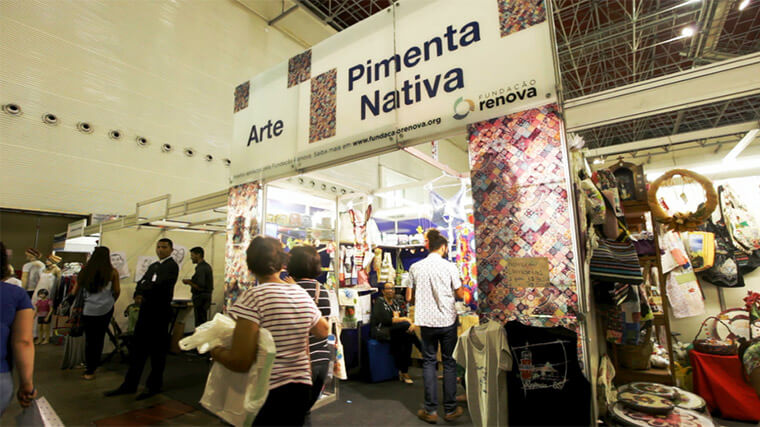Funded by the Renova Foundation, a group of 9 people had the opportunity to exhibit their products and participate in professional training courses
A group of artisans from Regencia and Povoacao (ES) had the opportunity to participate in the National Handicraft Fair, considered the largest of its kind in Latin America, held this month in Belo Horizonte (MG). Funded by the Renova Foundation, nine professionals could exhibit their products and participate in professional training courses of the National Service of Industrial Education (Senai). The action is part of the activities of the Stimulus to Local Economy Program, which acts to stimulate new business, create jobs and bring new perspectives to the population of the affected regions.

Besides being an opportunity for sales, the fair is a space where the exhibitor can make professional contacts. | Photo: Released
Participating from Regencia were artisans from the sewing group Pimenta Nativa and the Eliarte Group. One of them, Maria Helena Ribeiro, talks about the experience of participating in the fair: “For me and my colleagues it was just wonderful. It opened our horizon. In addition to exposing and selling our products, we took courses and learned a lot. What we have seen we can apply to create new work in our region,” she says.
Besides being an opportunity for sales, the fair is a space where the exhibitor can make professional contacts and also offers the artisan a program of courses and consultancy services. For Alexandra Silva, from the Art and Embroidery group from Povoacao, the fair offered the opportunity to exchange knowledge with other artisans: “It’s a great opportunity. It is very important to learn new techniques and to learn about other cultures, like the people of Maranhão,” he says.
Each edition of the National Handicraft Fair, around 1,200 stands are set up for 7,000 participating exhibitors and an average of 180 thousand visitors. Sales are around R $90 thousand.
Stimulus to the economy
The Stimulus to Local Economy Program of the Renova Foundation has mapped the vocations and economic potential of each town along the Doce River basin and has trained more than 115 professionals. Among the initiatives of the program stands out the Develop the Doce River fund, which will finance about 500 companies in Espirito Santo, applying special conditions, with an initial contribution of R$ 10 million working capital.
